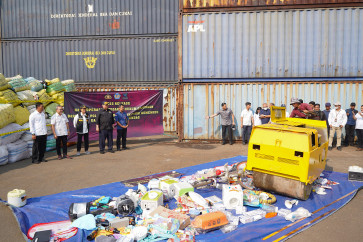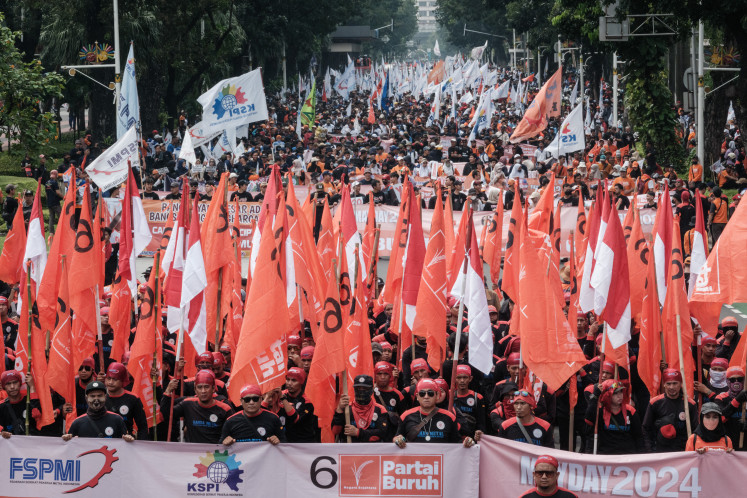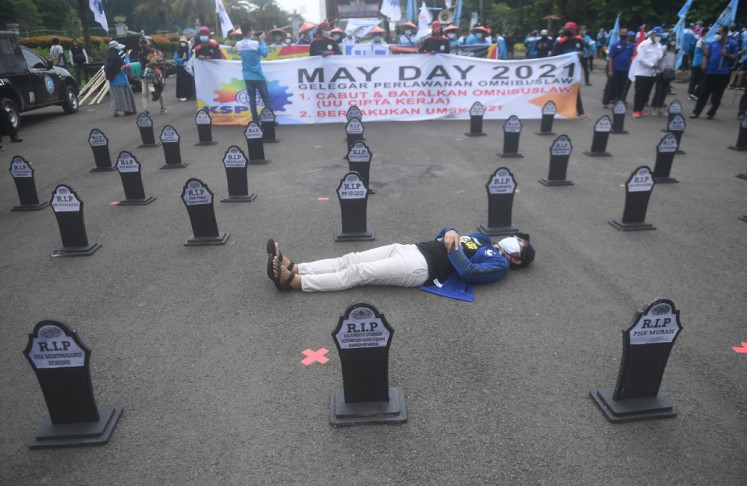Banks demand clarity on bail-in scheme
Indonesian bankers expect financial regulators to provide clear explanations regarding procedures to rescue ailing banks and to prevent financial panic in a time of crisis
Change Size

I
ndonesian bankers expect financial regulators to provide clear explanations regarding procedures to rescue ailing banks and to prevent financial panic in a time of crisis.
These expectations have been emphasized in response to upcoming regulations developed by regulators to follow up on the newly passed Financial System Crisis Prevention and Mitigation (PPKSK) Law.
The supporting regulations, currently being prepared by the Financial Services Authority (OJK) and the Deposit Insurance Corporation (LPS), will provide detailed explanations of the PPKSK Law passed by the House of Representatives on March 17.
The regulations, for example, will provide details of the steps to be taken by shareholders or owners of an ailing bank when macroeconomic indicators are in a state of emergency.
According to the law, the OJK, for instance, will require shareholders to provide extra capital to save their own banks in a “bail-in scheme” during times of crisis, replacing the old “bailout” policy that relies fully on state budgets.
To ensure that shareholders have extra funds, the OJK will require the conversion of certain assets, such as debt papers, into equities and funds that can be injected to a banks’
capital.
Bank Mandiri president director Kartika “Tiko” Wirjoatmodjo said regulators should provide clear definitions regarding the notion that shareholders or investors would be responsible for additional capital.
“The banking industry doesn’t understand clearly whether the definition extends to holders of senior debt. We need a more detailed OJK regulation [to explain this],” he said in Jakarta recently.
Currently, there is an OJK regulation that requires shareholders of troubled banks to convert their own assets in the bank. For instance, they could convert subordinated loans into equities. With the new law, the OJK will expand the requirement to allow shareholders of troubled banks to convert assets owned by third parties as well, such as bilateral loans and debt papers.
To ensure such a mechanism, the OJK will require debt papers issued by banks in the future to include a clause in which investors buying the debt papers agree that the shareholders of the banks can convert the assets into equities during a time of crisis.
“Uncertainty of treatment will increase the risk of securities issued by banks. However, a recent Fitch Ratings assessment shows that the rating will not change as the government still provides its implicit support,” said Tiko, who leads the country’s biggest lender by assets.
OJK deputy commissioner for banking supervision II Boedi Armanto said the agency’s upcoming regulations would list the type of debt papers allowed to be converted into equities and require certain clauses to be agreed upon between shareholders and the securities holders.
OJK commissioner Nelson Tampubolon said previously that the OJK’s upcoming regulations would also include further steps that could be taken by bank owners facing capital problems, including how to seek new investors.
Meanwhile, Bank Rakyat Indonesia (BRI) finance director Haru Koesmahargyo and Ivan Tan, a Singapore-based analyst with credit rating agency Standard and Poor’s, both said the new mechanism would probably increase the cost of funds for each debt paper issuance, meaning the banks would pay more expensive coupon rates.
“An equity conversion featured in a senior debt will of course increase the cost of fund in banks, because for instance, if I’m a holder of the bonds, I’ll be a subject to some downside risks,” Tan said.
However, the OJK said the probability of rising cost of funds for debt papers was low because banks would find the market price at a similar level given that the policy would impact all of them.
The unanimous approval of legislators for the PPKSK Law has paved the way for the country to better manage its financial industry after it was entangled in economic crises back in 1997-1998 and 2008-2009.
The law is now the “holy book” for policy-makers grouped under the Financial System Stability Committee (KSSK). The committee comprises the Finance Ministry, Bank Indonesia (BI), the OJK and the LPS.









